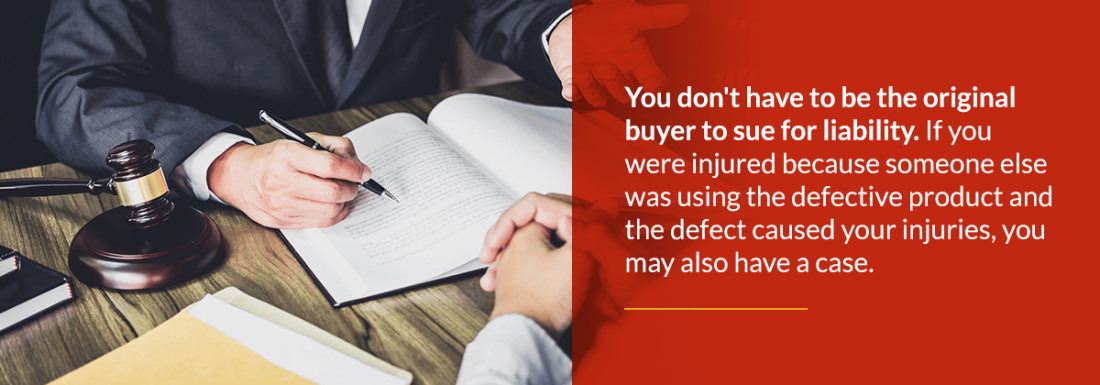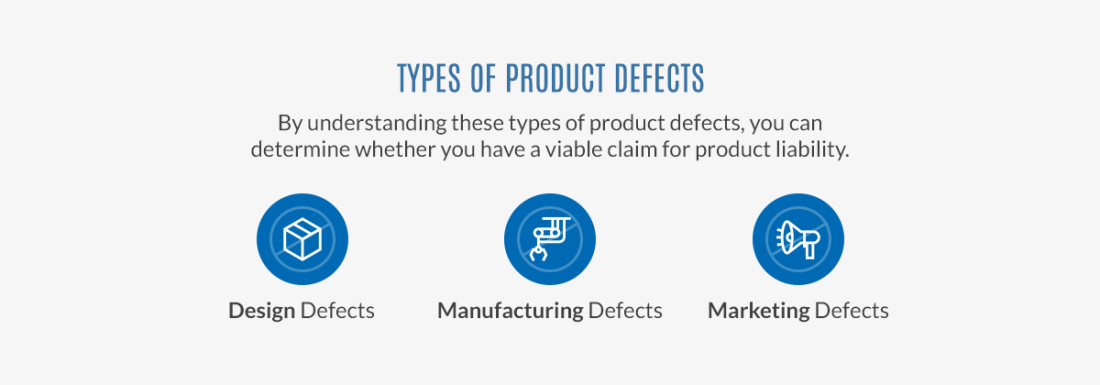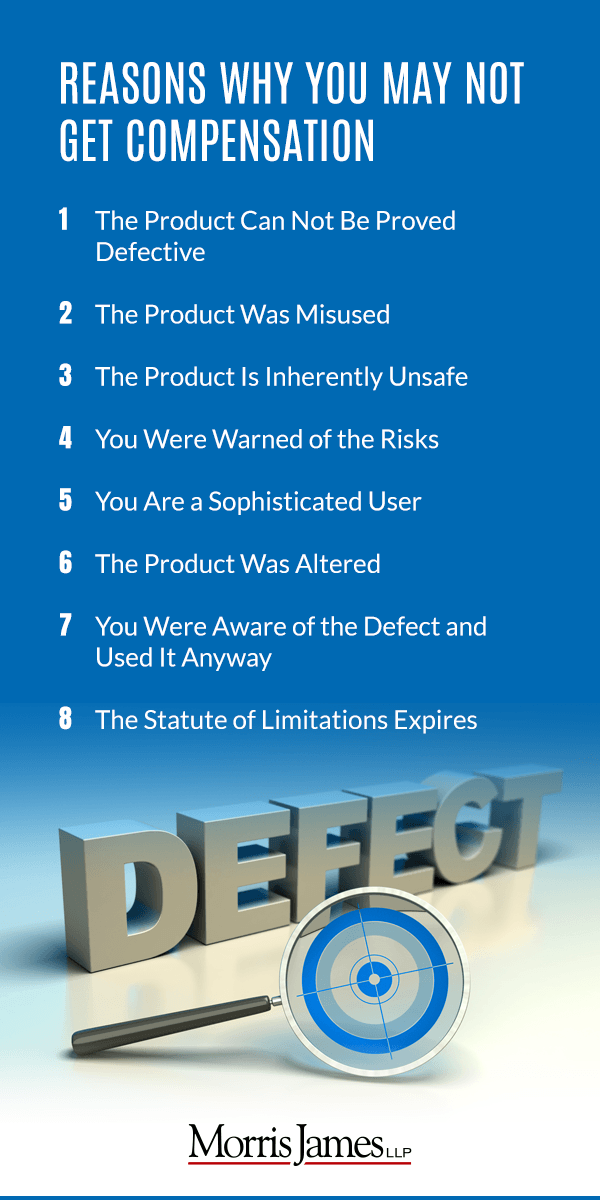Product Liability Case
In a product liability case, a product is defective or unexpectedly dangerous, and the buyer sustains an injury from using this defective item. A product can be defective in its manufacturing, design or labeling, and a consumer can bring a liability case against the manufacturer or seller if they are injured from using the defective product.
Every state has product liability laws, but the specifics vary from state to state. Familiarize yourself with the laws and requirements surrounding product liability in Delaware below to determine what you need to be successful in your case.
How to Establish a Product Liability Case

To prove and win a product liability case, the following elements are usually required:
- The product must be defective.
- You must have been injured or suffered a loss.
- Your injury must have been caused by the defect.
- You must have been using the product as intended.
If each of these elements applies to your situation, you may be able to pursue a product liability case. You also don't have to be the original buyer to sue for liability. If you were injured because someone else was using the defective product and the defect caused your injuries, you may also have a case.
When You Can Sue for Product Liability
The three different types of liability claims are negligence, breach of warranty and strict liability:
1. Negligence
As the plaintiff in a product liability case based on an allegation of negligence, you must show:
- You suffered an injury.
- The defendant owed a duty of reasonable care to you under the circumstances.
- The actions of the defendant breached this duty of reasonable care.
- This breach was the only or main cause of your injuries.
2. Breach of Warranty
As the plaintiff in a product liability case based on breach of warranty, you must show:
- An implied or express warranty was applied to the product.
- The product didn't meet the warranty's terms.
An implied warranty is imposed by law, while an express warranty states specific guarantees promised by the seller of the product.
3. Strict Liability
As the plaintiff in a strict product liability case, you must show:
- You were injured from the product as a result of the defect.
- The seller intended and expected the product to reach consumers without applying changes to the item.
- The defective product was sold without an adequate warning or in a condition that was unreasonably dangerous.
In Delaware, product liability claims are based on negligence or breach of warranty, but not strict liability. Carelessness on the manufacturer's side or seller's side needs to be shown. Though most states use strict liability, Delaware does not.
With strict liability, the defendant's intent doesn't matter if the defendant is liable when the plaintiff proves that the product is defective. This is not the case in Delaware — intent matters. This makes Delaware liability claims harder to prove, and it is much more important to hire an attorney who can argue the case.
Types of Product Defects

In a product liability case, the three types of product defects are design defects, manufacturing defects and marketing defects. By understanding these types of product defects, you can determine whether you have a viable claim for product liability.
1. Design Defects
This type of product defect refers to the unsafe or defective design of the product — this unsafe design results in an unreasonably dangerous product line rather than a single item. Even if the product was created exactly as the manufacturer instructed, the design itself is claimed to be inherently dangerous.
The following are examples of design defects:
- A child safety seat that causes the harness to be pressed against the child's neck in a dangerous way.
- A car that tends to flip over when the driver turns a corner.
- Electric blankets that may electrocute the user.
- Sunglasses that don't protect the eyes from UV rays.
The way that the product is packaged is also included under design defects, such as if the manufacturer fails to use childproof containers for dangerous items.
To have a product liability case based on a design defect in Delaware, the injury must be caused solely by the defect and would not have occurred if the product was not defective.
2. Manufacturing Defects
This type of product defect refers to a product that may have been well-designed but was created in a way that makes it unsafe. Because of an error when the product was being made, the item is flawed and unsafe. The product that causes injuries is different in some way from the others on the shelf.
The following are a few examples of manufacturing defects:
- Incorrect bolts, screws or fasteners.
- Harmful chemicals mistakenly used in a medication.
- Wires or circuitry improperly installed.
- Weak components, like plastic, that causes the item to break.
To have a product liability lawsuit based on manufacturing defects in Delaware, the defect must have been the cause of the injury.
3. Marketing Defects
This type of product defect refers to insufficient warnings or instructions. While the product may have been well designed and safe, the manufacturer didn't include proper instructions or warnings to ensure the consumer can safely use the item.
If a product is not obviously dangerous, and the user is not informed via instructions or warnings to exercise special caution while using the item, this could result in a product liability case. As such, this does not apply to products that are obviously dangerous. For example, a manufacturer does not have to warn on a package of knives that knives are sharp and can injure people.
The following are examples of marketing defects:
- A cough medicine that doesn't warn about dangerous side effects if taken with a common painkiller.
- A corrosive chemical that doesn't provide adequate instructions for using the product safely.
- A laundry detergent that doesn't adequately warn users that the product could be toxic if ingested.
The warning should be apparent and not buried in a dense instruction manual, for example. If a buyer is injured because of the manufacturer's failure to properly instruct or warn, then this injured user may have a claim for product liability in Delaware.
Who Is Responsible for the Defective Products?
Defective products can pop up in any industry, including beauty products, power tools, footwear and furniture. No matter what type of product you're using, if it's a defective product that results in an injury, you have the right to seek compensation.
Your attorney may seek compensation on your behalf from any one of the parties that helped deliver the defective product to the market, such as:
- The company that assembled or installed the defective product.
- The company that made the parts for the product.
- The seller or store from which you purchased the defective product.
Minor injuries tend to be resolved with a small settlement that provides you with a replacement product or coupons. However, cases for serious injuries are more complicated and can result in a larger amount of compensation.

Delaware includes the "sealed container defense," which states sellers of a closed container are not liable for its defective design or manufacturing. If the seller sold the product in a closed container and wasn't aware of the defect, they will not be held liable in Delaware.
Types of Compensation Available
There are four types of compensation available for product liability cases — compensatory damages, pain and suffering, loss of consortium and punitive damages:
- Compensatory damages: This type of compensation covers lost wages, property damage and medical bills for injuries that were caused by the defect of the product.
- Pain and suffering: This type of compensation refers to the pain and suffering endured by the user as a result of their injury.
- Loss of consortium: This type of compensation refers to the impact that the sustained injury had on the user's marital relationship.
- Punitive damages: This type of compensation is rewarded if the conduct of the defendant was egregious. Punitive damages tend to be limited, and will only be recovered if flagrant disregard for safety was observed by the manufacturer.
If you hope to receive compensation for your injury or loss caused by a defective product, you should know what types of compensation are available to you and what you may be able to anticipate receiving.
Reasons Why You May Not Get Compensation
Here are some of the reasons why you may not get compensation for an injury or loss caused by a product:

1. The Product Can Not Be Proved Defective
To win a product liability case, the product must be defective, and you must have been injured or suffered a loss that was directly caused by the defect of the product.
But what if you can't prove that the product was defective? If the product is not determined to be defective, you may not be able to get compensation for your injury or loss.
2. The Product Was Misused
You also may not get compensation if you were using the product for something other than the intended use or if you abused the product.
The defendant in a liability case is likely to argue that you weren't using the product as intended when you sustained your injury, or that your injury was caused by your own negligence. This comparative negligence could reduce the amount of compensation you can recover. If you were negligent, but your negligence didn't play any role in the cause of your injuries, you may still be able to fully recover your compensation.
In Delaware, if you are determined to have been more negligent than the defendant, you will not receive compensation. If your negligence was less than the defendant's, your compensation would be reduced in proportion to your attributed amount of negligence. If you were determined to be 25 percent at fault, for example, a $100,000 award would be diminished to $75,000.
Manufacturers are expected to anticipate misuse and provide adequate warnings to consumers about the potential dangers they could face if they don't use the product as intended. If this misuse was not foreseeable, however, then the defendant may not be held liable.
3. The Product Is Inherently Unsafe
You may not receive compensation if the product has well known, obvious risks that could have lead to your injury. For example, knives pose an obvious risk of cutting a person's skin, and gas can cause fires. A manufacturer or seller will not be held liable if the product is inherently unsafe.
4. You Were Warned of the Risks
Another reason why you may not receive compensation for your injury caused by a product is if you were warned of the risks through instructions or product warnings, and you ignored these labels or warnings.
5. You Are a Sophisticated User
This is another reason why you may not be able to hold the manufacturer liable for your injury. In this case, the manufacturer is not responsible for putting out a warning because the users of the product should have a sophisticated understanding of the risks associated with the product. This is common for pharmaceuticals.
6. The Product Was Altered
You also may not receive compensation if the product was altered. If the product was modified after leaving the manufacturer's or seller's hands, then the manufacturer or seller may not be held liable for your injury caused by the defective product.
7. You Were Aware of the Defect and Used It Anyway
Another reason you may not receive compensation for your injury is if you were aware of the product's defect and the danger it posed, but you used the product anyway.
8. The Statute of Limitations Expires
In Delaware, you must bring a product liability lawsuit within two years of your injury or the property damage that was caused by the defective product. However, Delaware also has what is known as the discovery rule, which may extend the period in which you can pursue a product liability case.
Under the discovery rule, if you didn't know or should have reasonably known about your injury until a later date, then the statute of limitations period begins when you are aware or should have been aware of the injury.
Ways to Ensure the Maximum Compensation for Your Product Liability Case
Product liability cases are time-consuming and are somewhat hard to prove. Many people can be involved from different jurisdictions. Because of this, it is very important to hire a product liability attorney in Delaware. An experienced attorney will be familiar with the laws in Delaware and can help you prove your case.
Contact us today at the Morris James Personal Injury Group to speak with one of our experienced attorneys about your personal injury case.








